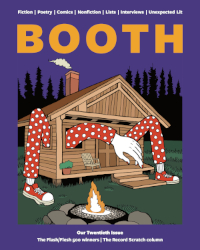When we first discover them, we cup them in our palms like gleaming cowrie shells. Each one is magical and precious, though we do not yet know why. On the playground, we tilt them gently into each other’s ears, gifts given freely without guile or guilt.
At sleepovers, we hide under the covers and pull them from their hiding places, turning them over and over, studying every detail by flashlight. We slowly sound out words like shekel and tongbei and daric—hard consonants for hard currency—and erupt in giggles when our stubby tongues twist over numismatics.
The grown-ups look at us huddling in the corner, a tangle of long hair and longer legs. How cute, they say, the girls are sharing secrets. Our eyes roll and thumbs scroll. Sharing is for communists. We learn how to mine our midnight thoughts for raw ore, how to stamp and engrave the metal into beautiful designs with sharp reliefs. We hide the coins deep in our pockets, rubbing them between our fingers until their rims are worn smooth, their luster a tarnished amber. When the opportunity strikes, we pull them out to pay for memberships in exclusive sisterhoods. We trade, sell, and exchange them for what they’re worth. Loyalties. Allegiances. A place a little closer to the center of the circle.
We rule by fiat, building an empire on our currency of secrets. Envious barbarian whispers dart among slamming locker doors, but we know they all just want to be one of us. We cross our arms and look down our patrician noses at them, asking: Do you support free trade? How will you contribute to the economy? Do you swear to support and defend our intricate monetary system, for richer or poorer, so help you God? Fortune favors the bold. The reserved ones never make it in.
The boys, sensing there is money to be made, whisper sweet nothings of love me tender in our ears. They claim to be chief economists, artisan engravers, expert notaphilists, whatever they think we might need. They show us coin designs we have never seen and try to talk us into their unorthodox, self-serving monetary theories. I will appreciate your currency tenfold, they swear. We scrutinize the promises and vote on them in committee. Yes. No. Maybe.
As our empire expands, the whispers grow louder and louder until they are a persistent, frenzied buzzing. The sounds stop abruptly when we approach, like the chirping of paranoid crickets.
Until one day, in the silence, a heretic laughs in disbelief, and suddenly everyone follows.
In an instant, we discover our economy runs on a trust that has been broken. Our innermost desires and fears have turned into crumpled old bills, common and worthless, stuffed in the smirking mouths of strangers like so much paper money to be burned.
The coins have been debased, the wealth destroyed, the secrets spent. But not for nothing. Now we know who can be trusted, and who has betrayed us. If there is a next time, we will build our walls of foreign exchange controls ten feet higher.
The economy teetering on the edge of depression, we slip into the darkness of gym bleachers, side alleys, websites browsed on incognito mode by men with glinting eyes and heavy breaths, and print more money using the ink of night.



